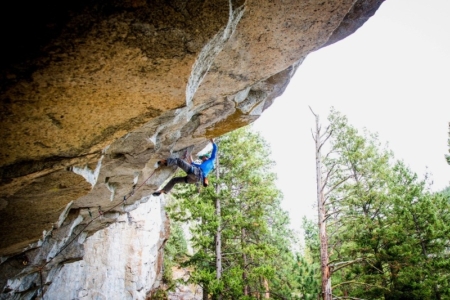Sonnie Trotter on Family Man, 5.14: Short Story and Video of a First Ascent
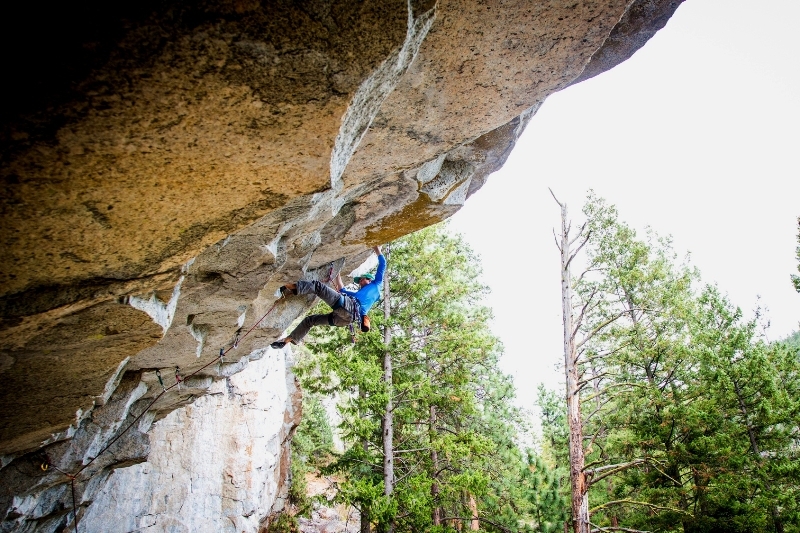
It all began five years ago, as many things do these days, with a simple email to a few of us Squamish cracks hounds from a friend in Okanagan Falls, British Columbia.
Hey Boys,
Check out these roof cracks. I think they’ll go free. Peace out.
– Doug
Doug and his wife Janet are longtime local climbers, hikers and explorers in the Skaha region, and probably know the lay of the land as good, or better, than any other living beings. But even more than that, they are simply two of the greatest people ever. Of course, this letter from Doug wouldn’t be complete without an eye-catching photograph or two, which he gracefully attached to his email for our viewing pleasure. I’ll admit, I was attracted to the climb right from the get-go but time, money and other commitments delayed a proper visit to the crag for nearly two years.
I only had a look on that first visit but then, this past March, I returned again with my wife Lydia and our two-month-old son Tatum. We were originally going to go to Smith Rocks but we couldn’t get a valid passport for our little T-unit in time. So, the next best thing was Skaha, which proved for many reasons to be even better than Smith, especially with a newborn baby in tow. For one, the drive is only about seven hours, versus 14 hours to Oregon. The crags are all relatively close to the parking area. There are very few steep hikes. And, since Skaha is located in the southern Okanagan area, it is technically an arid desert which makes for great climbing conditions even in late winter, an absolute godsend for us Canadians.
It didn’t take me long to hike up to where the roof cracks live and start messing about. Because I was alone, I climbed up to the summit of the dome and rappelled off an old tree perched on the slab. I lowered myself past some loose rocks and below the first roof. I used some small nuts and offset cams to direct myself closer to the line that first grabbed my attention in Doug’s email. But to my disappointment, it looked positively impossible.
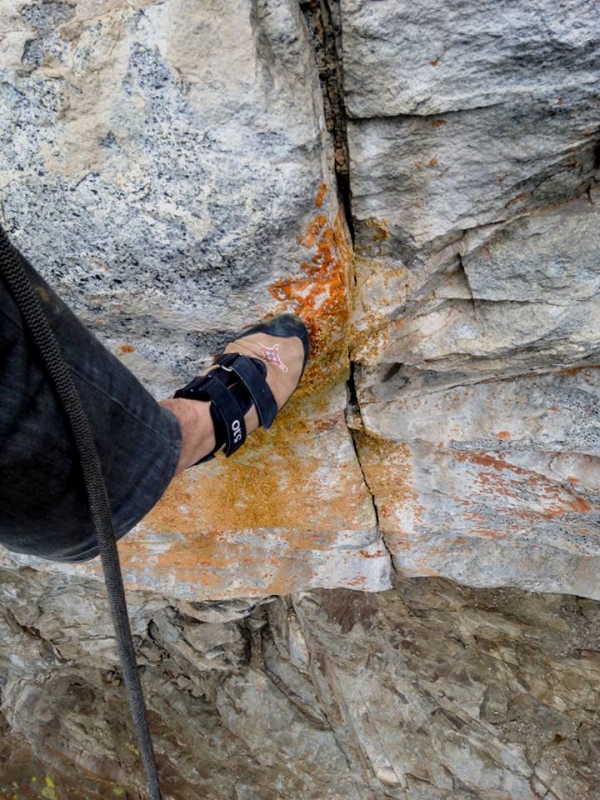 Checking out the crack for the first time on rappel back in March and seeing no possible way to climb the actual crack. It’s too skinny for my fingers. Photo: Sonnie Trotter
Checking out the crack for the first time on rappel back in March and seeing no possible way to climb the actual crack. It’s too skinny for my fingers. Photo: Sonnie Trotter
My first reaction was pure frustration. As climbers, we search far and wide for the perfect climbs, the ones that are both aesthetic and natural, close to the edge but not too far beyond our ability, something that demands a higher level of focus and attention than your average day-to-day climb. As an addicted first ascentionist, I’m always looking for those special climbs that can raise my level of inspiration and ability to a higher place. I’ve been lucky in the past to have found a few such gems, but this one looked like another dead-end road to me which, sadly, is more common than not. My only option was to rappel to the ground, hike back up to the top and retrieve my rope from its anchor.
But as I got lower down the rope, to my delight, I began to spot more usable features to the far left and to the right of the crack. So while it was impossible for my fingers to fit in the crack itself at times, there seemed to be some conveniently spaced face holds to offset this dilemma. My blood began to surge with excitement and I ran down the trail that evening with a healthy dose of oxytocin pumping through my veins. I knew now that it was possible, but I wasn’t sure yet if it was possible for me and my sleep-deprived forearms.
The next day, my wife offered to be my partner and give me a belay. She could see in my eyes how uplifted I felt by this new venture. But unlike the other Skaha crags, getting to this one is not terribly convenient. A steep, grinding hike in the hot sun leads to the base of the route, which is basically a large jumble of sharp boulders, and it’s often quite windy. Not exactly a comfortable day out with Mama Bear and her newborn baby. Lydia smiled as Tatum slept in her chest harness and without any hesitation she took the bag of wet wipes, diapers, down jackets and all the extra creams, powders, liquids and warm clothes that accompany a two-month-old infant in the hills. I followed earnestly as she started up through the long grass from the car park.
At the base of the cliff, my only safe option was to build an anchor off the trunk of a large tree. This way, Lydia and Tate would be completely free of a harness and all she would have to do is pull in the slack as I climbed. If she needed to attend to Tatum in any way, she could just leave me hanging there at any time and make sure the situation was settled before lowering me. It was certainly my first time being belayed by anyone who had a two-month-old bairn glued to her hip. I can’t really explain it, but having the support of my wife on the other end of the rope, as well as my son watching me from the security of the carrier, made the whole experience incredibly rich for me. Basically, I had the rare opportunity of combining the three things I cherished the most: new routing, the love of my life and our own little personal poop factory. I was in heaven.
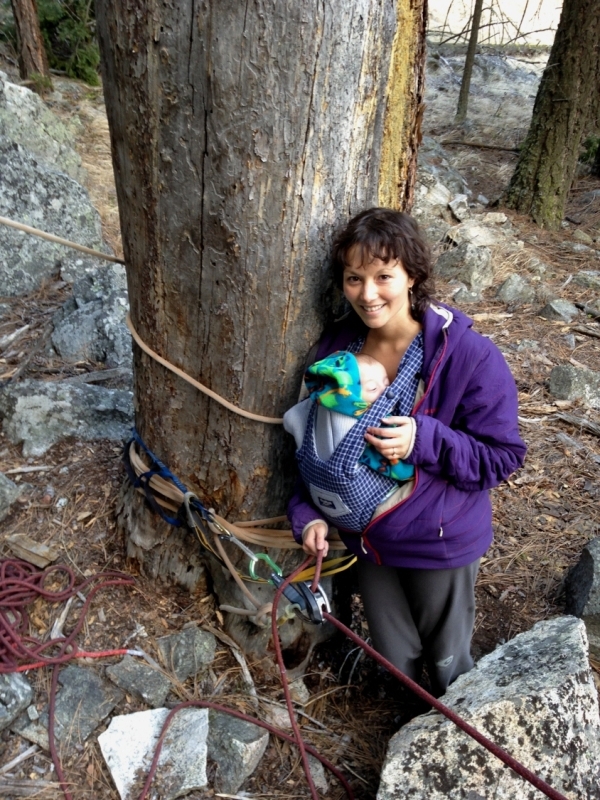 Lydia and Tatum belaying daddy off of a tree. Photo: Sonnie Trotter
Lydia and Tatum belaying daddy off of a tree. Photo: Sonnie Trotter
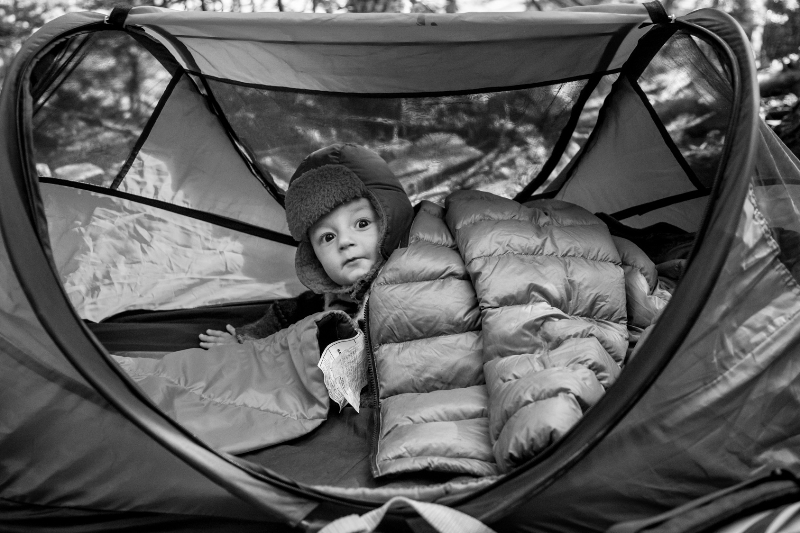 Tatum just waking up after a cozy little nap in the woods. Photo: Sonnie Trotter
Tatum just waking up after a cozy little nap in the woods. Photo: Sonnie Trotter
Unfortunately, the climb didn’t go down on that trip. In fact, there was still a move I couldn’t do. I wondered all summer long how I’d be able to overcome this problem when I returned. This fall, I put in another five-to-six days on the climb with my friend Jared Nelson and finally found a solution to the riddle. A left knee bar, high and above my right hand, would allow me to lever off of a bad hold to gain the purchase of a tiny seam statically. Before that I was trying to lunge for it without success. Now all I had to do was combine the lower crux with the upper crux, place a few cams in the middle and hope for the best.
On the last day, before the weather took a turn for the worse and Old Man Winter settled into the Okanagan for the season, Lydia, Tatum and I hiked up again one final time. With a few of the local climbers standing by to show their support, and my family at the base, I managed to hone in on some extra man power and clawed my way to the chains for the first ascent of this steep, burly and beautiful new route. I was absolutely over the moon.
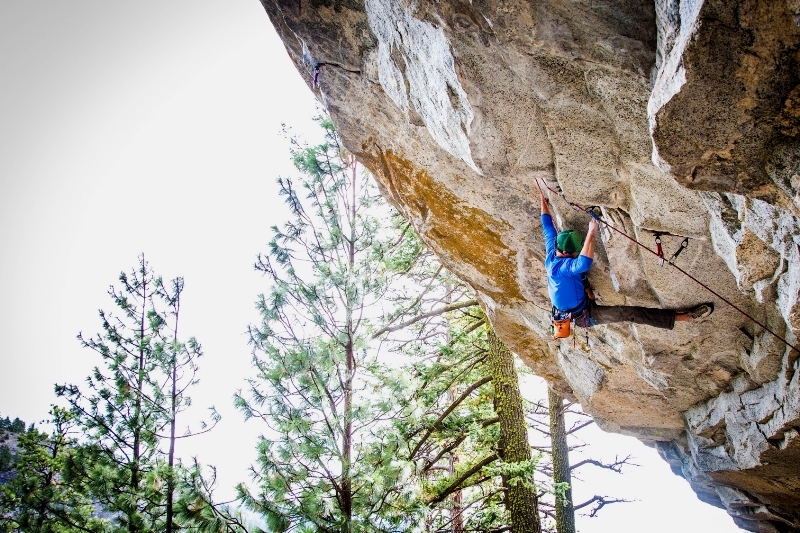 Sonnie working the bottom crux of Family Man. Photo: Sam Eastman
Sonnie working the bottom crux of Family Man. Photo: Sam Eastman
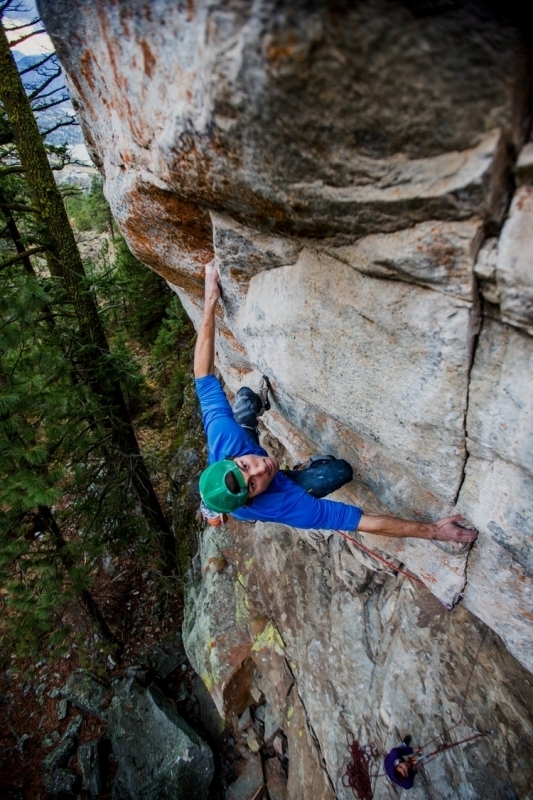
Staring down the next hold. Photo: Gabriel Zamorano
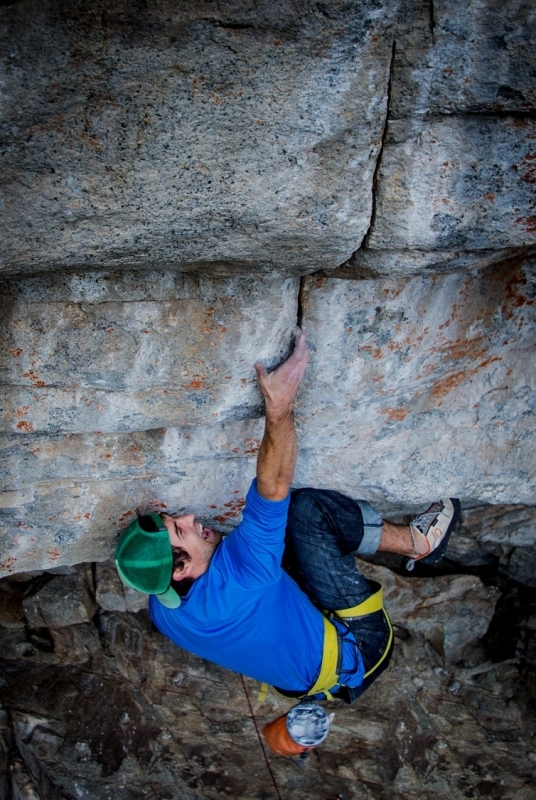
Sonnie gets a tips finger lock on the upper crux. Photo: Jared Nelson
A friend captured the ascent on camera from below. It’s hard to see how steep the climb is until you notice my chalk bag swinging around upside down, but it’s still neat for me to see it all come together the way it did. Like all of my first ascents, the grade is merely a suggestion. And more than any number could possibly mean, the opening of a new and inspiring line for others to enjoy is what matters the most. I hope you enjoy the clip.
Video: Family Man 5.14 from Sonnie Trotter on Vimeo.
To read more about Family Man, check out Chris Parker’s article at Rock and Ice.
